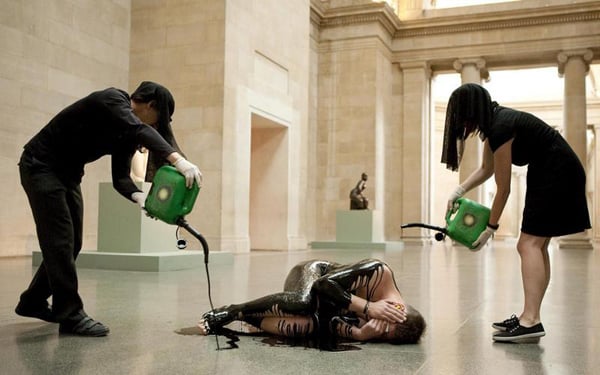Art World
Tate’s Hotly Contested BP Sponsorship Is Laughably Small
Why did they fight so hard to keep it secret?

Why did they fight so hard to keep it secret?

Coline Milliard

Today marks a significant victory for activists campaigning for Tate to drop its controversial sponsorship deal with oil giant BP.
Tate has revealed that it received between £150,000 and £330,000 per year from BP between 1990 and 2006, a sum which represents around 0.5 percent of the institution’s annual budget.
The disclosure comes at the end of a three-year-long legal battle between the institution and campaigners, spearheaded by Platform and Liberate Tate.
Acting on behalf of Platform, investigative journalist and cofounder of Request Initiative Brendan Montague challenged Tate in court in 2012, asking for the disclosure of the amount the institution received annually from BP, as well as minutes of the meetings when the partnership was discussed.
Tate repeatedly refused to disclose specific information pertaining to the arrangement, citing Freedom of Information exemptions (see Will Tate Disclose Details of BP Sponsorship?).
However, the Information Tribunal ruled in December 2014 that this use of the Freedom of Information Act was “mistaken” and “somewhat fanciful.” It gave Tate 35 days to disclose the amount it received from BP over the 16-year period, as well as some of the requested minutes (see Tate Has 35 Days to Disclose BP Sponsorship Figures).
Campaigners Protest
Campaigners staged several high-profile protests against the BP-Tate deal, including most recently, the unfurling of a giant black flag alluding to Malevitch’s Black Square (1915), the star exhibit of Tate’s then-current show of the Russian Suprematist’s work (see Liberate Tate Plans Mass Protest Over BP Sponsorship).
“The cumulative commitment of these funds totals almost £4 million for the period 1990-2006,” said a Tate representative in a statement to artnet News. “This is considerable funding.” The figure revealed today is nonetheless significantly smaller than Platform’s estimate of about £500,000 per year.
“The figures are embarrassingly small for Tate to go on justifying its BP relationship,” commented Platform’s Anna Galkina in a statement. “Tate can clearly do without BP.”
“A growing wave of universities, faith, and government institutions are choosing to divest and break ties with the fossil fuel industry,” she added. “It’s time for Tate to join them!”
Since the Deepwater Horizon disaster in the Gulf of Mexico in 2010, the oil industry has increasingly come under fire. According to the Guardian, $50 billion worth of investment has been pulled out from fossil fuel companies and redirected to more environment-friendly alternatives.
Tate, whose chairman is former BP chief executive Lord Browne, was clearly aware of the consequences of renewing its ties with BP. In the minutes released today and distributed by Platform, trustees acknowledged that the institution had taken “a public stance on sustainability” and that the “reputational risk” of maintaining links with BP was “significant.”
A Renewed Sponsorship Contract
Tate nonetheless renewed its sponsorship contract for five years in 2011. Tate director Nicholas Serota said at the time trustees had decided “it was the right thing to do.”
In its Monday statement, the museum explained, “Tate works with a wide range of corporate organisations and generates the majority of its funding from earned income and private sources. The support that these organisations give is extremely important and allows us to deliver a hugely successful and popular programme.”
Today’s announcement is another blow for BP, whose share value has dropped by more than a third since the 2010 spill. The group holds important investments in Russia, which has also left it exposed to the collapse of the ruble. The Guardian reports that a rumor is circulating in the finance community that BP might be “the next takeover target.”
Platform, meanwhile, won’t leave their fight following this first victory. According to a representative who spoke to artnet news on Monday morning, the activists will soon request the disclosure of the 2006-2012 figures.